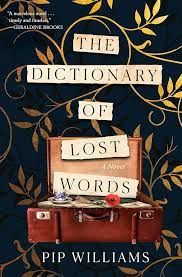This is an historical fiction about the writing of the Oxford English Dictionary in the late 1800s – 1900s. Esme grows up in the ‘Scriptorium’ where her father works with a staff of folks deciding what entries should be included in the dictionary, and how the definitions should be written.
If you are a wordsmith and enjoy thinking about definitions and considering philosophical questions about language, this book is for you. The Dictionary of Lost Words is a thought-provoking celebration of words, that highlights the power of language to shape the world.
My favourite part of the book was the beginning, when young motherless Esme sits under the work table in the Scriptorium (actually just a shed in a backyard in Oxford) and catches stray bits of paper discarded or neglected by the male lexicographers. Esme continues to become a collector of words, especially words that are important to women that got ‘lost’ in a male dominated society.
The story follows Esme’s personal life through years of women’s suffrage and the First World War as she assists in the (laboriously slow) progress towards publication of the dictionary. Esme’s character is the backbone of the novel, as she celebrates and champions the crucial roles that women played in an era when women seldom received recognition or credit. Characters like her Father and Lizzie were great as well.
After the first third, the book lagged a bit for me and the ending felt rushed and too tidy. But on the whole I really enjoyed it and am glad I read it. This trailer by the author describes the book well.



A enticing and persuasive review. Thank you, Joanne. May I post to my reading club’s page? The author’s video is delightful as well. Her deep reverence for the era, the women, and words and their power comes through loud and clear in her wide smile and understated style. I’d heard of the book, and now, I’m buying and reading it!
Thanks for your note. Yes, of course you can link to your reading club page! Happy reading!
I agree with you about your couple “could have been better” comments, but still this book was one of my 2023 favorites.
Honestly, I loved the first 1/3 so much, and I know who I will definitely recommend it to. One of them works on dictionary writing! It was a good read and I can see how it could easily be a favourite!